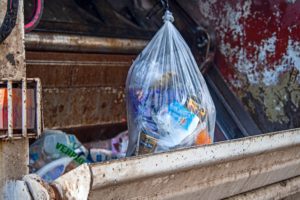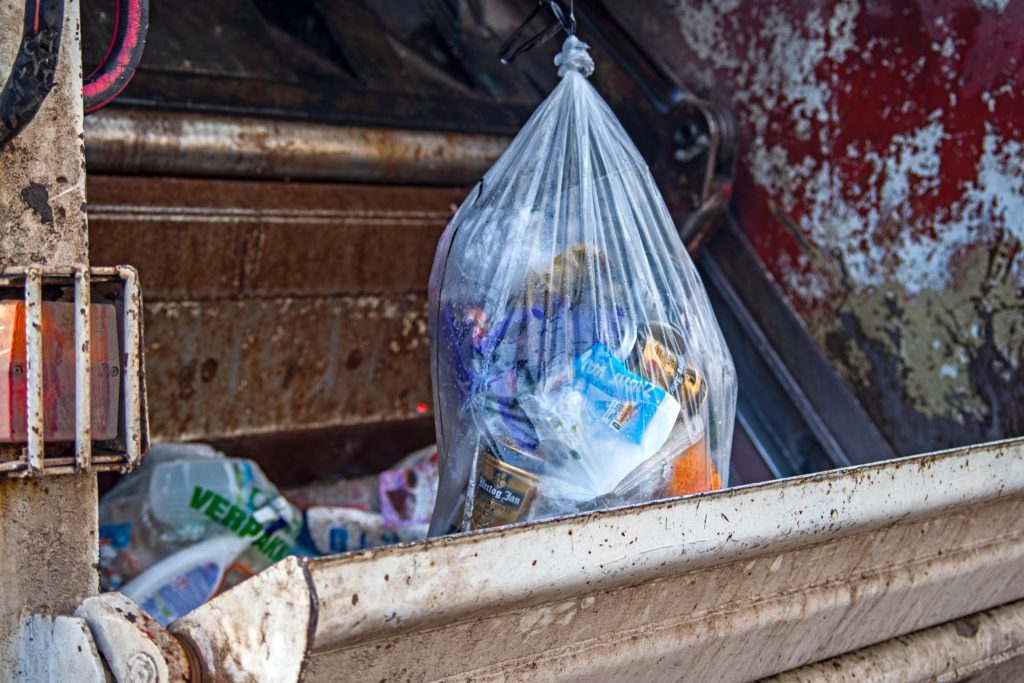From the ‘Deplastify the Planet’ Class: A Circular Economic Solution to Plastic Waste
In most states, plastic recycling is currently orchestrated by public and private waste management companies. But should this be the case? This is the question that arose during my fall term class, Desplastify the Planet. Deplastify the Planet is a one-of-a-kind project-based class offered jointly by the UC Berkeley Sutardja Center for Entrepreneurship and Technology (SCET) and Schoolab, a global innovation studio, where students work with real-world companies with a single goal in mind – ‘deplastify’ the planet. Students from all disciplines and backgrounds work in small teams on semester-long projects. Each team is paired with a corporate partner and spends the entirety of the semester brainstorming, building, testing, and solving for how to curb the excessive use of plastic.
My team and I were assigned to develop a policy-based solution to transition the Bay Area to a more circular economy, and we chose plastic waste management as our area of focus.
Currently, waste management systems only address and facilitate the removal of plastic, not its creation. However, the empty plastic container is, in fact, just one component of the waste generated in plastic production and consumption. And thus, waste management companies only come into play after most of the damage has already been done. As UC Berkeley Climate and Energy Policy Professor Kurt Spreyer states, “It is not just the chemical extraction and it is not just the waste, it is the whole economy that plastic facilitates – how it reproduces generation after generation. Plastic, symbolically, is a nine-out-of-ten in terms of destructiveness…one or two steps behind the atomic bomb.”
Indeed, plastic wastes are part of a complex, global economy. There are three sources of monetary value that wastes comprise: collection and disposal, extractive value, and value from prevention and diversion. The main value in waste diversion lies in avoided human health impacts, environmental contamination, and greenhouse gas emissions. In her book, Waste, International Environmental Policy professor Kate O’Neill estimates the global cost of dealing with waste will rise from $205 billion a year in 2010 to $375 billion a year by 2025. Further, landfills are running out of space for waste, with plastics accounting for over 18% of landfill occupancy.
I really started to understand the scope of plastic pollution a couple of weeks into the class. I initially heard about this course from a professor in my research fellowship who recommended it based on my interests. I enrolled, expecting a traditional learning environment with lectures, homework assignments, quizzes, etc., but was pleasantly surprised to find it was much more of a self-guided, discovery-focused model of learning. This allowed me to explore ideas with independence and deeper focus. To develop an understanding of the economy of wastes, I began by interviewing waste management companies, local parks and recreation employees, local representatives, and waste editorial writers. I compiled that research to develop a policy brief, which I then submitted to several manufacturing companies in the state of California.
The core of the policy brief was based on the fundamental components of a circular economy, as outlined by Walter Stahel, our mentor and advisor, in The Product Life Factor. The opportunity to work with the founder of this particular theory was invaluable during this course. In his paper, Stahel outlines the current mindset of economists: that they prioritize optimizing products that can be easily replaced, leading to an economy constantly consuming “short-life, incompatible goods, and products characterized by lack of reparability.” Hence, he proposed the idea of the circular economy: to create products with more durable lifespans leading to less disposable goods and a reduction in waste.
Understanding this concept was key in creating our team’s primary approach to the challenge of plastic waste. We aimed to answer the following question: How can private corporations, rather than waste management systems, be held accountable for the financial and environmental strain placed on our landfills and oceans? As of now, landfill economics and corporate economics are separate entities; however, we proposed mechanisms to couple this divide. Our set of solutions placed the burden of plastic waste back on their companies of origin, therefore incentivizing these corporations to make better packaging decisions and strides towards longer life cycles of plastic and other resources. The necessary public policy, then, would encourage a more circular economic system, and thus reduce plastic waste in California.
We suggested this could be achieved through the following measures:
- Manufacturer product tracking – creating awareness of packaging life cycles
- Plastic separation by manufacturer – placing subsequent collection and recycling responsibilities on the manufacturers of origin
- Re-vending machines – incentivizing recycling in less recycling conscious communities
During my time in the class Deplastify the Planet, I was given the unique opportunity to prototype and develop a policy approach to reimagine plastic production with a circular economic system in mind. “Deplastify the Planet” gave me the guidelines necessary to facilitate this project, while allowing me the freedoms to make it my own, be creative with my approach, and ultimately come up with a solution to be presented to stakeholders across the state.
Our finding may sound simple, but it can have an astronomical effect on plastic waste. To address the current issue from the standpoint of circular economy theorists, one must put the burden of recycling back on the manufacturers of origin. That’s right – Let’s stop with the PSAs, and make recycling a private affair.
Deplastify the Planet is a one-of-a-kind project-based class offered jointly by the Sutardja Center for Entrepreneurship and Technology (SCET) and Schoolab, a global innovation studio, where students work with real-world companies with a single goal in mind – ‘deplastify’ the planet. Students from all disciplines and backgrounds work in small teams on semester-long projects. Each team is paired with a corporate partner and spends the entirety of the semester brainstorming, building, testing, and solving for how to curb the excessive use of plastic.
From the ‘Deplastify the Planet’ Class: A Circular Economic Solution to Plastic Waste
In most states, plastic recycling is currently orchestrated by public and private waste management companies. But should this be the case? This is the question that arose during my fall term class, Desplastify the Planet. Deplastify the Planet is a one-of-a-kind project-based class offered jointly by the UC Berkeley Sutardja Center for Entrepreneurship and Technology (SCET) and Schoolab, a global innovation studio, where students work with real-world companies with a single goal in mind – ‘deplastify’ the planet. Students from all disciplines and backgrounds work in small teams on semester-long projects. Each team is paired with a corporate partner and spends the entirety of the semester brainstorming, building, testing, and solving for how to curb the excessive use of plastic.
My team and I were assigned to develop a policy-based solution to transition the Bay Area to a more circular economy, and we chose plastic waste management as our area of focus.
Currently, waste management systems only address and facilitate the removal of plastic, not its creation. However, the empty plastic container is, in fact, just one component of the waste generated in plastic production and consumption. And thus, waste management companies only come into play after most of the damage has already been done. As UC Berkeley Climate and Energy Policy Professor Kurt Spreyer states, “It is not just the chemical extraction and it is not just the waste, it is the whole economy that plastic facilitates – how it reproduces generation after generation. Plastic, symbolically, is a nine-out-of-ten in terms of destructiveness…one or two steps behind the atomic bomb.”
Indeed, plastic wastes are part of a complex, global economy. There are three sources of monetary value that wastes comprise: collection and disposal, extractive value, and value from prevention and diversion. The main value in waste diversion lies in avoided human health impacts, environmental contamination, and greenhouse gas emissions. In her book, Waste, International Environmental Policy professor Kate O’Neill estimates the global cost of dealing with waste will rise from $205 billion a year in 2010 to $375 billion a year by 2025. Further, landfills are running out of space for waste, with plastics accounting for over 18% of landfill occupancy.
I really started to understand the scope of plastic pollution a couple of weeks into the class. I initially heard about this course from a professor in my research fellowship who recommended it based on my interests. I enrolled, expecting a traditional learning environment with lectures, homework assignments, quizzes, etc., but was pleasantly surprised to find it was much more of a self-guided, discovery-focused model of learning. This allowed me to explore ideas with independence and deeper focus. To develop an understanding of the economy of wastes, I began by interviewing waste management companies, local parks and recreation employees, local representatives, and waste editorial writers. I compiled that research to develop a policy brief, which I then submitted to several manufacturing companies in the state of California.
The core of the policy brief was based on the fundamental components of a circular economy, as outlined by Walter Stahel, our mentor and advisor, in The Product Life Factor. The opportunity to work with the founder of this particular theory was invaluable during this course. In his paper, Stahel outlines the current mindset of economists: that they prioritize optimizing products that can be easily replaced, leading to an economy constantly consuming “short-life, incompatible goods, and products characterized by lack of reparability.” Hence, he proposed the idea of the circular economy: to create products with more durable lifespans leading to less disposable goods and a reduction in waste.
Understanding this concept was key in creating our team’s primary approach to the challenge of plastic waste. We aimed to answer the following question: How can private corporations, rather than waste management systems, be held accountable for the financial and environmental strain placed on our landfills and oceans? As of now, landfill economics and corporate economics are separate entities; however, we proposed mechanisms to couple this divide. Our set of solutions placed the burden of plastic waste back on their companies of origin, therefore incentivizing these corporations to make better packaging decisions and strides towards longer life cycles of plastic and other resources. The necessary public policy, then, would encourage a more circular economic system, and thus reduce plastic waste in California.
We suggested this could be achieved through the following measures:
- Manufacturer product tracking – creating awareness of packaging life cycles
- Plastic separation by manufacturer – placing subsequent collection and recycling responsibilities on the manufacturers of origin
- Re-vending machines – incentivizing recycling in less recycling conscious communities
During my time in the class Deplastify the Planet, I was given the unique opportunity to prototype and develop a policy approach to reimagine plastic production with a circular economic system in mind. “Deplastify the Planet” gave me the guidelines necessary to facilitate this project, while allowing me the freedoms to make it my own, be creative with my approach, and ultimately come up with a solution to be presented to stakeholders across the state.
Our finding may sound simple, but it can have an astronomical effect on plastic waste. To address the current issue from the standpoint of circular economy theorists, one must put the burden of recycling back on the manufacturers of origin. That’s right – Let’s stop with the PSAs, and make recycling a private affair.
Deplastify the Planet is a one-of-a-kind project-based class offered jointly by the Sutardja Center for Entrepreneurship and Technology (SCET) and Schoolab, a global innovation studio, where students work with real-world companies with a single goal in mind – ‘deplastify’ the planet. Students from all disciplines and backgrounds work in small teams on semester-long projects. Each team is paired with a corporate partner and spends the entirety of the semester brainstorming, building, testing, and solving for how to curb the excessive use of plastic.


